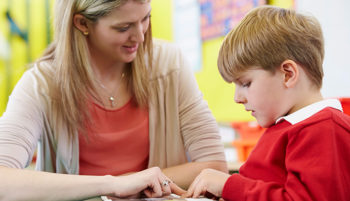How Teachers Support Students’ Unique Learning Talents
 How Teachers Support Students’ Unique Learning Talents
How Teachers Support Students’ Unique Learning Talents
I work primarily with kindergarten through 2nd grade students. Each student I work with has unique talents, skills, and needs to remediate or nurture. When working with over 20 students in a classroom, I must focus on creating curriculum for the greater good of the student population based on the grade-level common core standards mandated by California. Then I must adapt my curriculum to meet the needs of highly challenged students as well as gifted and talented students. When working with second grade students after the COVID school shutdowns, a few students are still emerging at the first-grade level in their reading and math skills while others are performing at the 4 through 5th grade levels.
Literacy Skill Development at Different Proficiency Levels
When working with reading groups, I have to help beginning readers learn their sight-based words and provide them with readers and activities that reinforce reading comprehension while looking at pictures and using phonics to lean the sounds of letter combinations. The focus is to learn phonics while also learning how to comprehend stories at a basic level by asking prediction, story content sequencing, and reading understanding questions. I also have students illustrate with simple words the big ideas in the stories.
Students who are reading at the second-grade level can sound out words correctly and are learning how to sustain their reading skills with more complex comprehension questions. They can summarize what they read and are able to apply their reading comprehension to everyday and new learning situations. Their vocabulary is expanding as they use the context in a story to define the meaning of new vocabulary words.
Several second-grade students can read 4th through 6th grade level books. They have mastered reading the Harry Potter series as well as the Babysitters-Club series. Many graphic novels are highly sophisticated and students love the illustrations as they learn to read longer length multi-chapter novels. When students can read at this level, they are able to evaluate, analyze, and apply what they have read to other situations and learn to write evaluative book reports.
Math Skill Development at Different Proficiency Levels
As I work with math skill development for challenged students, I have them learn their basic addition and subtractions skills while using math manipulatives. I encourage them to practice basic addition and subtraction math facts with flash cards and math games at home.
Students at second grade level are learning to solve addition and subtraction 2 and 3 digit numbers without and with renaming when using various strategies including number bonding, use of number lines, writing a math story, and writing the solution in standard form or expanded form. They are also learning about measurement, geometry, graphing, and basic fractions.
When working with several advanced students, I first complete the daily assignment with them. Then they will tutor students requesting help with the daily assignment. I also prepare advanced work problems for them to solve along with third grade advanced problems. They love being challenged. I started with 5 advanced students and now have half the class challenging themselves with advanced math problems.
Putting It All Together
As I challenge more students with advanced work, I had several advanced readers research and write about rattlesnake bite antidotes. Others studied snow crystals and created detailed illustrations about the composition of snow crystals while writing a factual story about how snow crystals formed. We have written and researched opinion stories about ideal pets. For black history month, our students are learning about how Ruby Bridges entered a school with no other white students initially joining her. The students will write an opinion story about how they would feel if no other students would join them in class to learn because of the color of their skin or because of another prejudice against them. As the students expand their research, problem-solving, and critical thinking skills, I am impressed with their growing leadership and compassion for their classmates. They are becoming supportive cheerleaders and tutors for their classmates as they expand their knowledge and leadership skills.